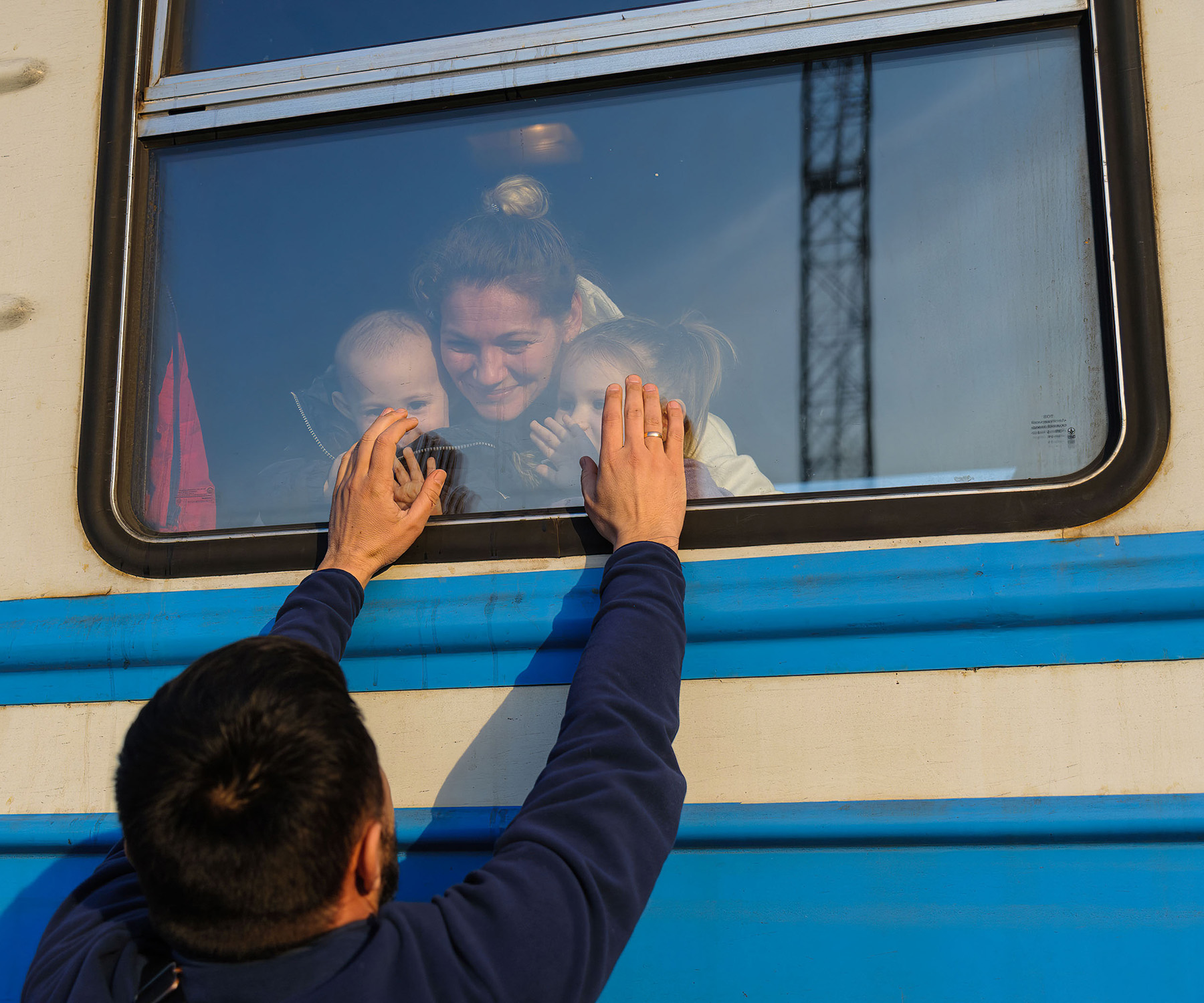The Russian invasion of Ukraine has triggered Europe’s largest population movement since the Second World War. More than four million people have left the country and a quarter of the population has been displaced.
As a journalist, I have reported from many conflict zones, including Afghanistan, Iraq, Yemen, Syria and Libya. But what I find striking about the war in Ukraine is the sheer scale of the number of women and children fleeing the Russian invasion.
For weeks, Ukrainian cities in the north, east and south of the country have faced constant bombardment from Russian artillery. Many towns, villages and communities have been flattened. Lives have been lost. Homes destroyed. Livelihoods overturned. Most of those trying to flee the brutalities of this war have been making their way west to the relative safety of Lviv – just 70 kilometres from the Polish border.

More than four million people have fled Ukraine following Russia’s violent invasion.
(Image: Getty)It is the city’s main railway station which has best captured the human struggle of this conflict and the story of the Ukrainian people. It is a story of pain and sorrow. A place where hundreds of thousands of families are torn apart as mostly women and children frantically try to board the overcrowded trains heading to Poland and beyond, while sons, brothers, husbands and fathers stand on the platform bidding farewell. Men of fighting age aren’t allowed to leave the country. So, they say their goodbyes and head in opposite directions – uncertain of when, or if, they will ever be reunited with their families again.
The station is crowded with trains arriving every few hours from the worst-affected areas. Mothers occasionally are forced to pass pushchairs overhead to safety, their children unsure of exactly what is happening but nonetheless sharing the fear and anxiety of their parents. Despite the desperation, there is also a dignified silence amongst the people. Those who have made it this far are considered the lucky ones.
Like millions across Ukraine, they’ve spent days in underground bunkers in an effort to avoid the shelling. Their journeys are all quite similar – they wanted to stay and wait it out, but the fighting got so unbearable that they had no choice but to leave.

Women and children fleeing the invasion spend days in underground bunkers in an effort to avoid the shelling.
(Image: Getty)In the chaos and confusion, I meet Anastasia and her daughter, Alicia. They’ve arrived from Ukraine’s second largest city of Kharkiv in the east of the country.
Like so many women at this train station, Anastasia is perfectly groomed; her manicured fingernails painted crimson, she is rugged up in a bright silver puffer jacket, her mousy brown hair scraped up in a bun. She tells me they travelled 18 hours on an overcrowded train, sleeping in the aisle with her child in her lap. Anastasia immediately pulls out her mobile phone and begins to show me the destruction in Kharkiv.
Image after image, video after video of apartment blocks completely destroyed, furniture overturned, windows burst, doors off their hinges, glass and debris carpeting the floors. She tells me these are all homes of her friends and family. “I really wanted to stay, but as the situation got worse, I knew I had to leave for the sake of my child. We stayed in the corridor of my flat for a few days, but when we realised this was dangerous, we moved into my parents’ underground bunker. After seven days, I found a way out.
“I can never erase from my daughter’s mind the horrors she has witnessed. I am very worried about my parents who couldn’t leave, they are elderly and the journey out would have been too gruelling.”
Anastasia says she packed so quickly that she can’t remember exactly what she has brought with her. Seven-year-old Alicia grips tightly onto her cat and has a small box with her two pet rats in it. “This is our entire life. These animals and some clothes. I have a friend in Germany and I’m hoping we can make our way there. But first, I need a place here in Lviv,” says the single mother.
Anastasia and Alicia are ushered by some volunteers to a registration area where they will be given all the necessary help, including food, shelter and clothing.
WATCH: Russian leader puts nuclear forces on alert in Ukraine. Story continues after video.
When the conflict began, Ukraine President Volodymyr Zelensky, a former comedian turned wartime leader, called on the citizens of his country to unite. He told young and old to pick up arms. The Ukrainian people responded by waging a surprisingly successful resistance against their invaders. The country-wide mobilisation has seen the government share bomb-making instructions with grandmothers.
In a former art gallery in the centre of Lviv, I meet university students who show me how they are making camouflage nets for troops fighting on the frontlines. Alina, 20, tells me that just eight weeks ago she was at school studying, and now she is responsible for the operation at the centre. The petite, perky young woman has her golden locks pulled back in a high ponytail, with blue and yellow ribbons – the national colours of Ukraine – woven through her hair. She says there are now 180 volunteers working here.
“We make roughly 40 nets a day and the soldiers come and either pick them up or arrange the transportation to send them to the frontlines,” she says. “I’ve never done anything like this before, but like all the people here, I want to do whatever I can to help. I believe victory will be ours.”

Making camouflage nets is one of the ways locals can help troops fighting on the frontlines.
(Image: Getty)Whether it is opening up their homes to those who are seeking shelter or making Molotov cocktails, the volunteer movement has stepped up against this Russian invasion. The thriving civil society in Lviv has focused on solidarity, activism and charity as part of its war effort. Despite the devastation that the conflict has caused in other parts of the country, so far this fierce sense of unity and the will to defend their homeland seems to have slowed down Russian forces.
While spirits are high in a place like Lviv, this is also a city on tenterhooks. The haunting soundtrack of air-raid sirens is a daily reminder that their nation is at war. Each siren horn is a warning that Russian jets may be overhead or nearby, forcing people to rush into the many underground bunkers for cover.
I have visited this city numerous times as a tourist in the past and enjoyed the many museums, galleries, cafes and restaurants. Little did I know that beneath these spaces across the city there are bunkers which were built in the Second World War. All residents seem aware of exactly where they are and kindly steer you in the right direction.
WATCH: Ukraine and Russia in peace talks as Putin denounces the West. Story continues after video.
Their faces are often full of dread as they make their way into the shelters – some from Lviv itself, others strangers to the city but all too familiar with the eerie wail of the sirens. And even though everyone goes through the motions once they start blaring, the fear is always the same – knowing that somewhere, something is being struck.
Ukrainians know the road ahead will be long and brutal. They are bracing themselves for whatever comes next. On numerous occasions the Russian President, Vladimir Putin, has attacked Ukraine’s status as a separate nation, insisting it isn’ta real country. While the people I speak with tell me they don’t know what the future holds, there is one thing they are certain of – this unprovoked invasion has galvanised the strongest sense of nationhood Ukrainians have ever felt.
Yalda Hakim is chief presenter on Impact with Yalda Hakim on BBC World News.
You can read this story and many others in the May issue of The Australian Women’s Weekly – on sale now

